.
“It is hard to capture how thoroughly Trudeau has misjudged the moment. …Kamal Pannu, 33, is a Sikh immigrant and trucker from Montreal. He doesn’t believe in vaccinations; he believes in natural immunity. He had joined the convoy because the Covid restrictions in the surrounding province of Quebec had become too much to bear. He said that he and his wife used to do their grocery shopping at Costco, until the government decreed that the unvaxxed would be barred from big-box stores. Since then, their monthly grocery bill had jumped by $200."
2/10/22, “What the Truckers Want,” Rupa Subramanya, substack
“I’ve spoken to 100 of the protestors gathered in the Canadian capital. What’s happening is far bigger than the vaccine mandates.”
For two weeks, the 18-wheelers, the semis, the tractors and the pick-up trucks streamed through the snow and ice into the center of Ottawa, the Canadian capital.
They came from across the country. Vaxxed, unvaxxed, white, black, Chinese, Sikh, Indian, alone or with their wives and kids. They huddled around campfires. They set up pop-up kitchens and tents with block captains doling out coffee and blankets. They honked (and honked and honked). They blasted “We Are the World.” And everywhere you looked, someone was waving the Maple Leaf.
It dipped to 4 degrees. The mayor declared a state of emergency. And they didn’t budge.
The truckers were scared of running out of gas—freezing to death in their little truck beds in the middle of the night. The city threatened to arrest anyone who brought it to them. In response, hundreds of Ottawans did just that. The truckers stayed put.
They are a city inside a city whose inhabitants—there are an estimated 8,000 to 10,000—were outraged with a country that seemed to have forgotten they existed. This past Sunday, as if to confirm that suspicion, Prime Minister Justin Trudeau, who has yet to meet with Freedom Convoy leaders, took a personal day. On Monday, during an emergency debate at the House of Commons, he called them “a few people shouting and waving swastikas.”
I live in downtown Ottawa, within view of Parliament Hill, and have spent the past 10 days or so bundled up and walking around the protests. I have spoken to close to 100 protesters, truckers and other folks, and not one of them sounded like an insurrectionist, white supremacist, racist or misogynist.
They sound like Ivan, 46, who emigrated, with his wife, Tatiana, from Ukraine to build a new life in New Brunswick, in eastern Canada. “We came to Canada to be free—not slaves,” he said. “We lived under communism, and, in Canada, we’re now fighting for our freedom.” (Like so many truckers, Ivan refused to share his last name.)
B.J. Dichter, a spokesman for the Freedom Convoy, is vaccinated, and he estimates that many—maybe most—of the truckers at the protest are, too.
“I’m Jewish. I have family in mass graves in Europe.
And apparently I’m a white supremacist,” he told me on Wednesday.
Ostensibly, the truckers are against a new rule mandating that, when they re-enter Canada from the United States, they have to be vaccinated. But that’s not really it. The mandate is a moot point: The Americans have a similar requirement, and, anyway, “the vast majority” of Canadian truckers, according to the Canadian Trucking Alliance, are vaccinated. (The CTA represents about 4,500 truckers nationwide.)
So it’s about something else. Or many things: a sense that things will never go back to normal, a sense that they are being ganged up on by the government, the media, Big Tech, Big Pharma.
One thing was indisputable: There was this electricity coursing through the streets, and it felt like it could get out of control. It didn’t help when a handful of protesters sported swastikas and Confederate flags. Or when GoFundMe shut down the convoy’s fundraiser, announcing that donors had two weeks to reclaim their money before it was sent to “established charities” chosen by Freedom Convoy organizers. Or when the cops started arresting locals, including the elderly.
It is hard to capture how thoroughly Trudeau has misjudged the moment. “This pandemic has sucked for all Canadians,” he said Monday. As for the protest? “It has to stop,” declared the prime minister.
If he sauntered down to the mess of rigs on Wellington Street, across from the Parliament building, opposite the mall and the war memorial, if he talked to these people for a few minutes, he would understand: It will not stop.
What’s happening in Canada right now is bigger than the mandates.
The convoy is spearheaded by truckers, but its message of opposition to life under government control has brought onto the icy streets countless, once-voiceless people declaring that they are done being ignored. That the elites—the people who have Zoomed their way through the pandemic—had better start paying attention to the fentanyl overdoses, the suicides, the crime, the despair. Or else.
Kamal Pannu, 33, is a Sikh immigrant and trucker from Montreal. He doesn’t believe in vaccinations; he believes in natural immunity. He had joined the convoy because the Covid restrictions in the surrounding province of Quebec had become too much to bear. He said that he and his wife used to do their grocery shopping at Costco, until the government decreed that the unvaxxed would be barred from big-box stores. Since then, their monthly grocery bill had jumped by $200. “Before,” he said, “we didn’t look at the price of what we were buying. Now, we sometimes put items back because we don’t have that much money.”
Peter, 28, a long-haul trucker from Ontario, told me that a divide had opened up all across the country. Pointing to the gleaming, ritzy condominiums near Parliament, he said he used to deliver the concrete stairs in those buildings. Since the cross-border vaccine mandate kicked in in mid-January, he’s been out of work. He refused to get vaccinated, he said, because the whole thing had been so politicized, and you couldn’t be sure who to trust. He refused to give his last name, he said, because he didn’t want the government coming after him, and he wanted to work again.
I heard this over and over from the truckers. And it was not entirely crazy. The CTA, which has publicly criticized the Freedom Convoy, said in a January 29 statement addressed to the truckers in Ottawa: “Your behavior today will not only reflect upon you and your family but the 300,000 plus fellow Canadians that, like you, take great pride in our industry.”
If you pointed out to people like Peter—and I did—that almost every doctor in the country had been vaccinated, it didn’t matter. There was bodily autonomy. And privacy. And religious exemptions. And anyway, how could you know what the doctors were thinking? You couldn’t trust the press or politicians, he said, recalling that in the fall of 2020, then vice-presidential candidate Kamala Harris expressed skepticism of any vaccine approved under President Donald Trump. Now, they were being ordered to get this vaccine developed…under President Donald Trump.
“If you’re not vaccinated,” Peter said, “they treat you like garbage lying on the streets.”
Odia Jean-Pierre from St. Jerome, Québec. (Dan Aponte)
Theo, 24, felt the same way. He wasn’t a trucker—he used to work at a major accounting firm and now works another big company—but he was angry, like the truckers were. “They treated me like a second-class citizen,” he said, referring to his old firm. He explained that he’d refused to get vaccinated. He’d been vaccinated for other things. But he had a hereditary heart condition that, he said, made the Covid vaccine inadvisable—but he couldn’t get a medical exemption. At work, they made him mask up constantly. He felt like he was being publicly shamed. So, he quit.
Theo’s brother, Lucas, who’s 21, is also unvaccinated for similar reasons. He’d planned to go to law school, but, being unvaccinated, he had to take only online courses, but some of the courses he’d need to graduate were only available in person. Now, his future was uncertain.
A lot of the truckers who had driven in from Vancouver and Winnipeg and Quebec City expressed this same uncertainty. It was getting really expensive to get by: rent, utilities, groceries, everything. Almost everyone who was poor or even middle-class was mired in debt. They told me that they expected this sort of wealth gap in America, but not in Canada.
The divide that already existed between the haves and have-nots largely mapped onto the new chasm between those who supported the mandates and those who did not. And that was creating this huge, weird fracturing everywhere.
Mackenzie, 24, from Ottawa, works as a bartender at a popular downtown restaurant near Parliament. She had Covid, got better, and believes it’s her choice not to get the vaccine. She isn’t an anti-vaxxer. She’s been vaccinated for other things. But Covid wasn’t the same as malaria or the flu. And there were European countries, like Germany and Switzerland, that recognized recovery from infection as an alternative to vaccination. Canada, like the United States, does not.
It was ironic, she said that she could serve but couldn’t dine at the restaurant where she worked. She’d lost a close friend over her vaccination status. When I asked her why she wouldn’t tell me her last name, she said she didn’t want to upset her parents. “Not many people know this side of me,” she said.
Chris, a 40-year-old trucker from Toronto, said that he’d gotten vaccinated so he could keep his job, but that his participation in the protest had torn his family apart. “My father has spat in my face and disowned me as his son. Told me I’m not worth the family name because I will not vaccinate my children,” he said. “My mom and I have battled back and forth.”
Matt Sim, 43, who immigrated to Canada from South Korea, is director of operations of an IT start-up in Toronto and came to Ottawa with his wife to join the protests. He’d had Covid, and then he’d recovered, and he was skeptical of all the hysteria surrounding the vaccines. His family, back home in Korea, had lived through the Asian financial crisis of 1997, and that had made him skeptical of the media, the government, and powerful people in general. “There’s a group in power that always manages to create panic among the masses and siphon off public funds,” Sim said.
The Freedom Convoy came as a surprise. Unlike the United States, Canada had never seen mass protests and civil disobedience on this scale.
And it is not dying down. Since Monday, truckers have blocked the main route linking Windsor, Ontario, and Detroit, Michigan—a route that some 8,000 trucks use each day and accounts for 25 percent of trade between the two countries.
The protesters feel the mood shifting. On Tuesday, the premier of Saskatchewan, Scott Moe, announced the end of his province’s proof-of-vaccination policy. “It is time for us also to heal the divisions in our communities over vaccination,” he said.
Joël Lightbound, a leading member of Parliament from Quebec and a member of the Liberal Party, Trudeau’s party, slammed the federal government. The government, Lightbound said, had gone “from a more positive approach to one that stigmatizes and divides people.” The truckers say they won’t leave Ottawa until the mandates, the lockdowns—everything—are dropped.
There was a new consciousness, too, a feeling among the truckers that they weren’t as alone as they’d thought. Blake, a contractor who had driven in his pickup to Ottawa from his home in Toronto, called the protest a “diesel-fueled hippie commune.” We met one night, very late, in the freezing cold, while Blake, in beige overalls, danced with 50 other protesters on a makeshift dance floor. There was a D.J. playing Gloria Estefan’s “Conga.”
The solidarity was infectious. There were copycat protests popping up in Helsinki, Finland, and Wellington, New Zealand and Nice, France (they planned to hit Paris and Brussels). There were truckers organizing in the Netherlands, Australia and the United States. Among the Americans who had driven up to Ottawa there was talk that soon the big rigs would descend on Washington, D.C.
“Seeing the country fall apart like this is heartbreaking,” Sim said. “For me, this is the line in the sand. If we lose this battle, I’d like to move out of Canada.” He said that he was thinking of maybe heading to Florida. A lot of the truckers were thinking about the States. But not yet. “I feel that I owe it to me and others that share my values to, at least, fight for this.””
“You can follow Rupa Subramanya’s ongoing coverage of the truckers here. And if you were as struck by the portraits that accompanied her story as we were, check out Dan Aponte’s photography.”
................
|
|
|
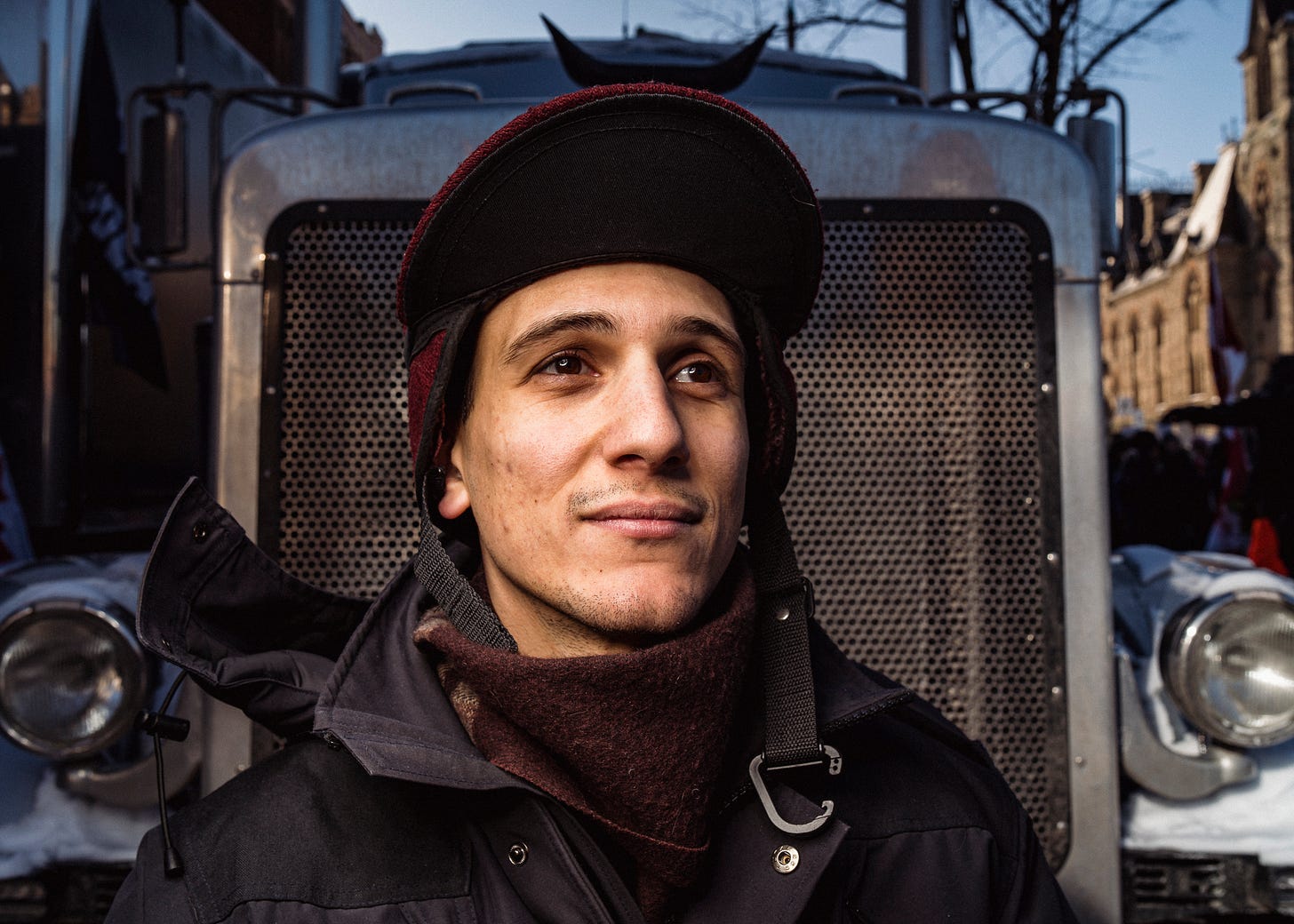
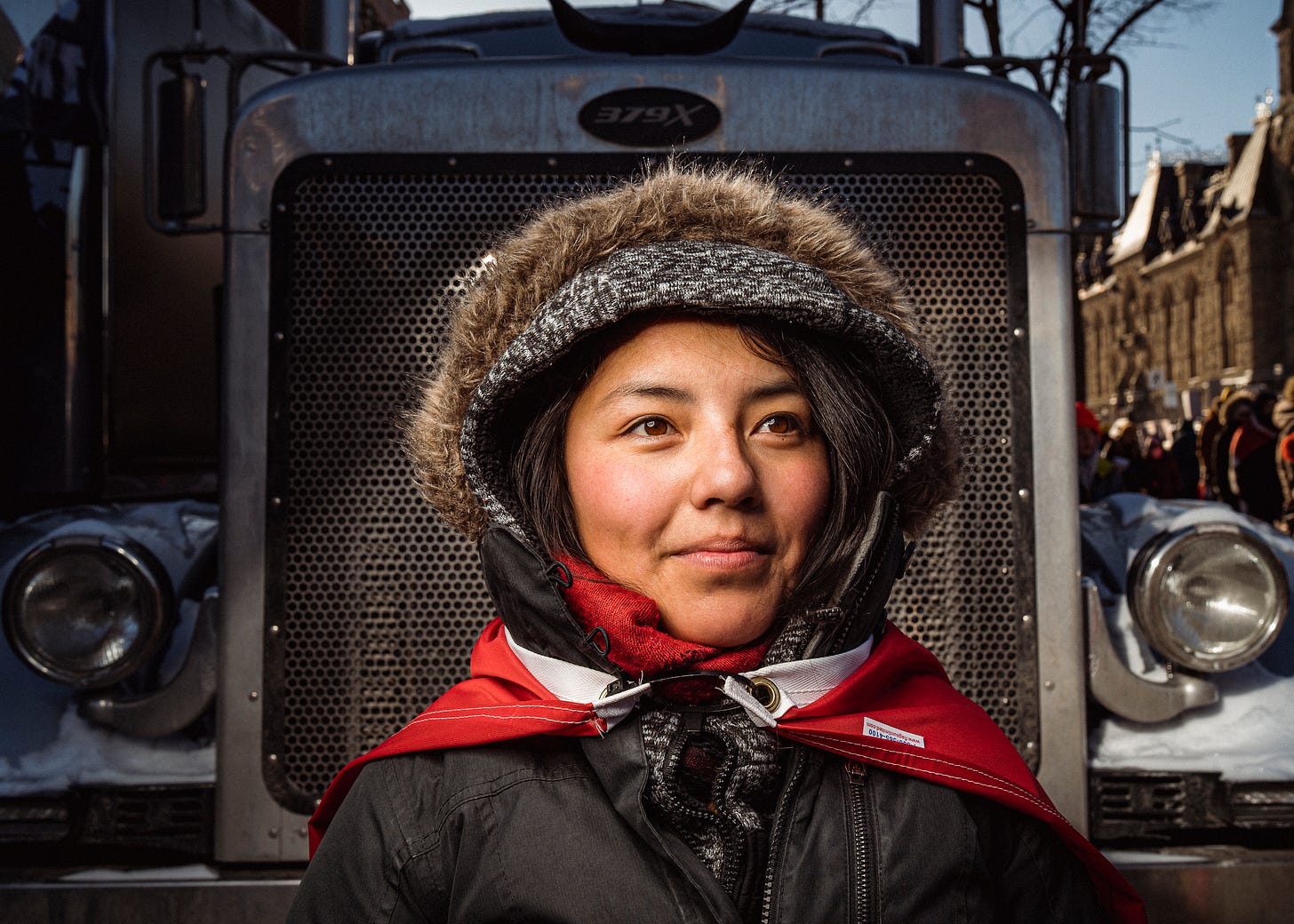
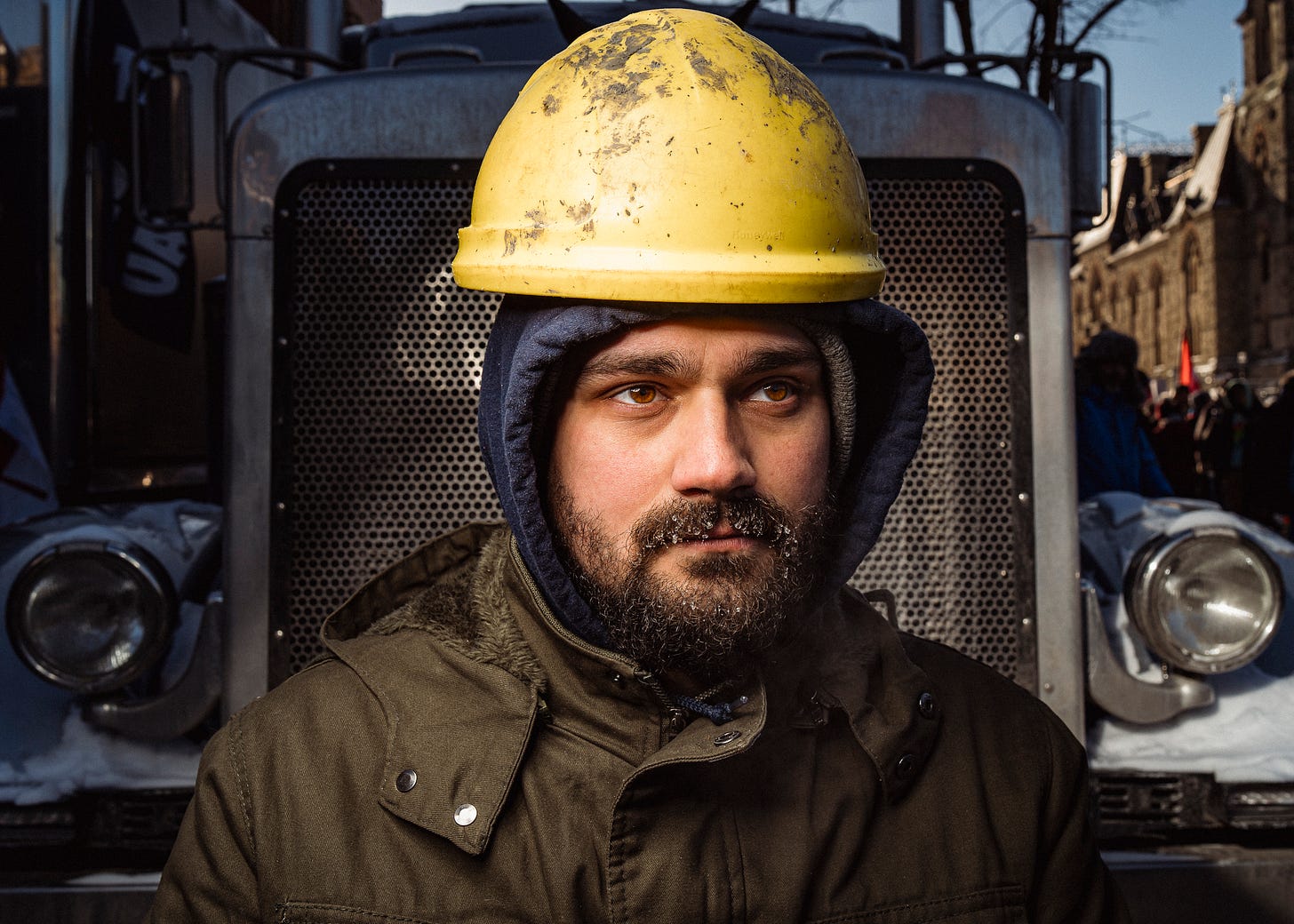
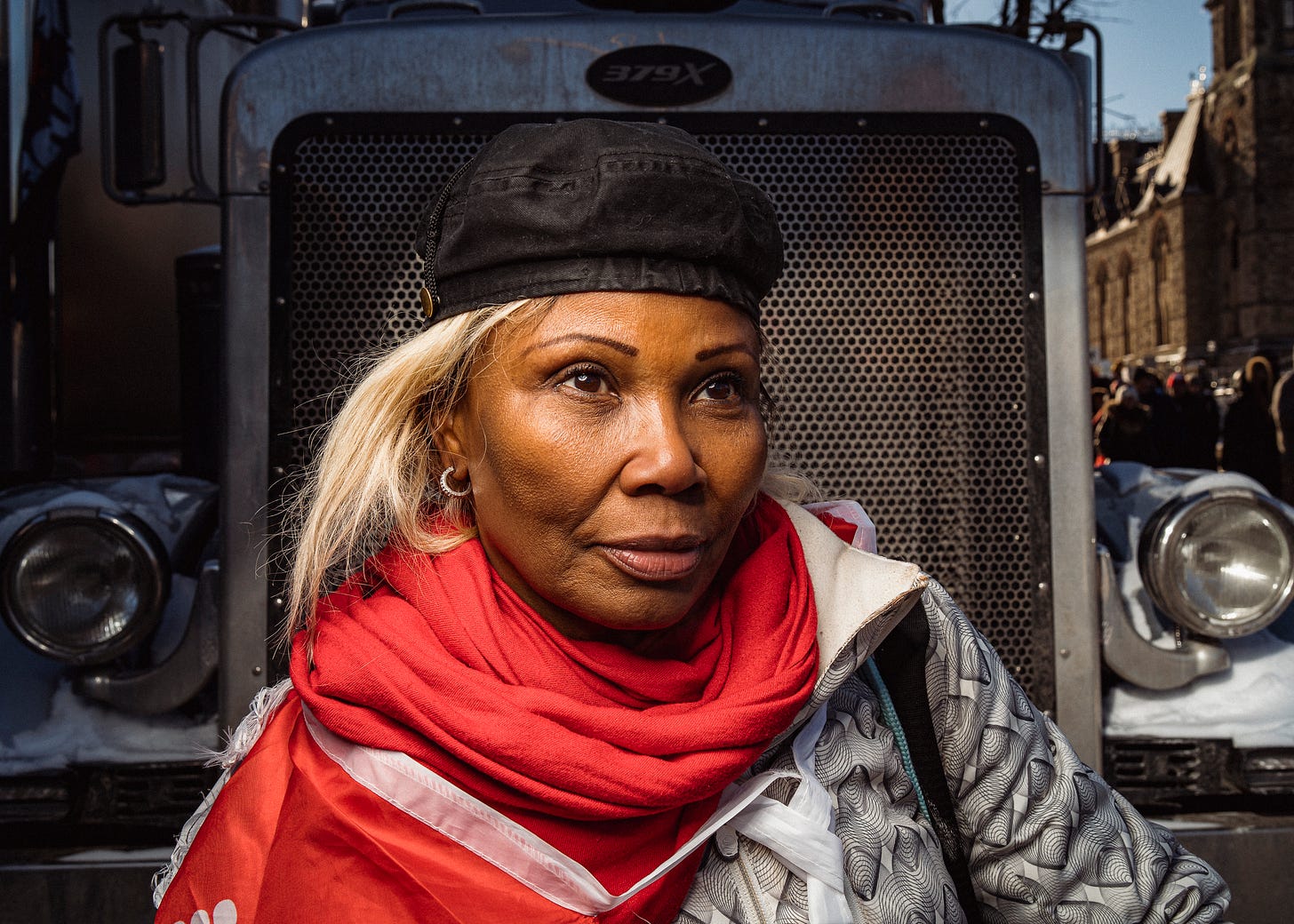
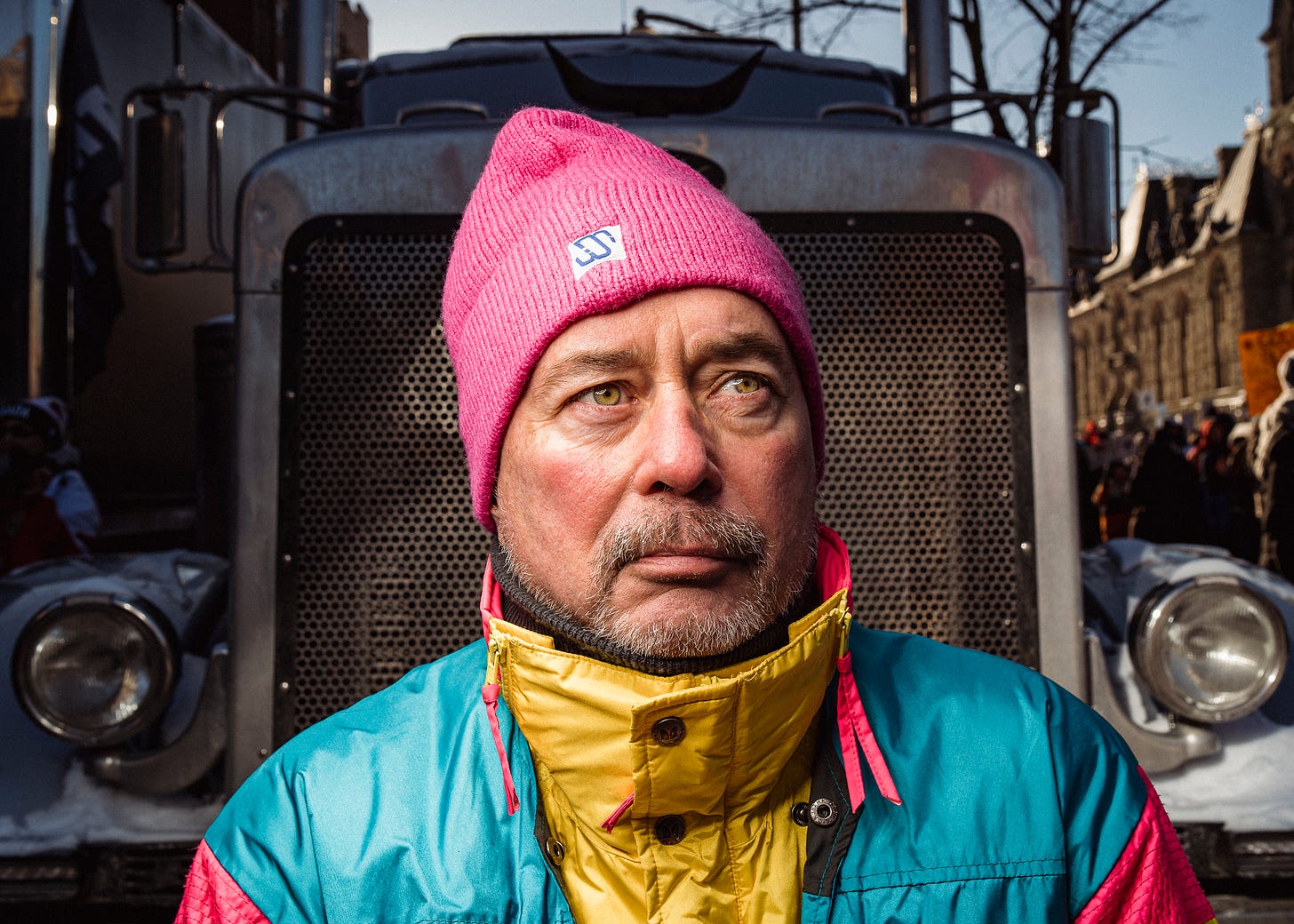
No comments:
Post a Comment